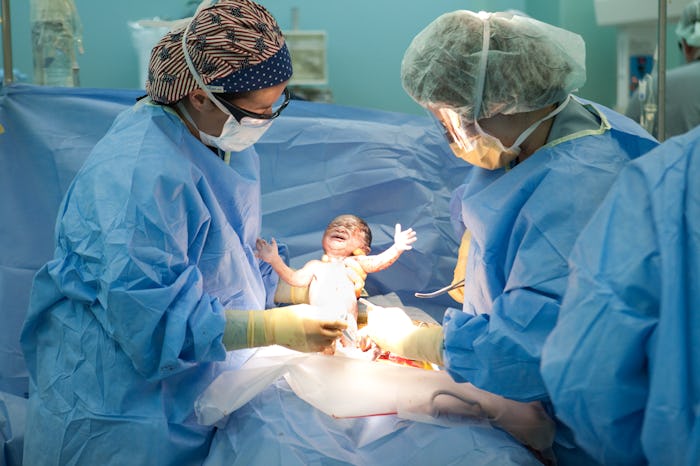Life

Women Who've Had A C-Section May Face Hysterectomy Complications Later In Life
The recovery process after giving birth (vaginally or through a C-section) is different for everyone. Some women experience pain and side effects for a period of time, while others are working out in a matter of weeks. And not everyone has complications, but a new study has found that C-sections may present a different set of complications later in life. Specifically, according to the new research, women who've had a C-section and need a hysterectomy at some point in the future may have to have an additional surgery — and that's not great news.
The study, published in the Journal of the American Medical Association found that women who underwent one C-section had a 31.1 percent risk of re-operation after a hysterectomy, compared to women who gave birth vaginally, according to ABC News. The risk increased even more for women who had more than one C-section.
Complications associated with having a hysterectomy and a C-section include bleeding or infection, according to the study. The study also found that women who gave birth by C-section also had an increased risk of needing a hysterectomy.
A hysterectomy, the procedure where a doctor removes a woman's uterus, is only done when a woman experiences intense pain from things like endometriosis and abnormal uterine bleeding or heavy period pains, according to Everyday Health. Hysterectomies are also done in cases of uterine and cervical cancer.
So why does this matter? A C-section is the most common surgical procedure in the United States (hysterectomies come in second). In fact, one in every three babies is born this way. And while some women don't have a choice in whether they have one, it is still a major procedure.
"Because women often have more than one baby, we are the surgeons that routinely cut on the same scar over and over again and that makes surgery technically harder each time ," the study's co-author, Dr. Neal Shah, who leads the Delivery Decisions Initiatives at Ariadne Labs, said, according to Global News Calgary.
"C-sections and hysterectomies are two of the most common surgeries performed on women," Shah continued. "And those who require both are at significantly higher risk of complications."
As ABC News' Chief Women's Health Correspondent Dr. Jennifer Ashton told explained to the news outlet: "In the future, after delivering a baby, many women may need other surgeries, and these future operations can become more complicated from the internal scar tissue left behind from a C-section,"
The results from this study, according to Global News Calgary, point to cutting down the number of C-sections that are not "medically necessary." Especially because women who have the surgery can't predict if they'll need a hysterectomy later in life.
It's quite surprising just how many C-sections are deemed unnecessary by doctors. According to The New York Times, in most cases, doctors perform C-sections to avoid potential malpractice lawsuits and the process is reportedly quicker than vaginal births, giving women more control about when and how they deliver their child.
This study, which was able to spot a long term effect of having a C-section, is important to be aware of — even if women are not planning on having a hysterectomy in the future.